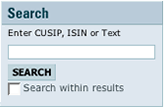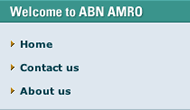







|
|
|
| Overview | How to Calculate | For Example | Risk | |||||
|
REX: How is Payment or Delivery at Maturity Calculated? At maturity, investors in Knock-In Reverse Exchangeable Securities will receive either a cash payment equal to the original principal amount of the securities or the stock redemption amount. The type of payment or delivery at maturity will be calculated by first determining if the market price of the underlying stock was at or below the predetermined "knock-in level" at any time from the date the securities were priced to, and including, a specified determination date. If the market price of the underlying stock was at or below the "knock-in level" at any time during such period, the payment at maturity will be determined by comparing the closing price of the underlying stock on the determination date to the closing price of the underlying stock on the date the securities were priced. If the market price of the underlying stock was never at or below the "knock-in level" during the period from the date the securities were priced to, and including, the determination date, the payment at maturity will always be a cash payment equal to the principal amount, irrespective of the closing price of the underlying stock on the determination date. If, however, the market price of the underlying stock was at or below the "knock-in level" at any time during the period from the date the securities were priced to, and including, the determination date, the closing price of the underlying stock on the determination date will be used to determine the payment or delivery at maturity. If such closing price is equal to or greater than the closing price of the underlying stock on the date the securities were priced, the payment at maturity will be a cash payment equal to the principal amount. If, on the other hand, such closing price is below the closing price of the underlying stock on the date the securities were priced, investors will receive the stock redemption amount. Typically, the "knock-in level" is set between 70% and 80% of the closing price of the underlying stock on the date the securities were priced.
The closing price of the underlying stock on the determination date may be substantially lower than the closing price of the underlying stock on the date the securities were priced, and could be zero. Accordingly, investors may lose some or all of their initial principal investment in the securities. * No fractional shares will be delivered at maturity. Instead, a cash amount equal to the number of fractional shares times the closing price of the underlying stock on the determination date will be paid along with delivery of the shares of the underlying stock. |
||||||||